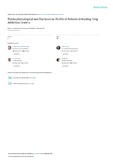Mostrar el registro sencillo del ítem
Psychophysiological and psychosocial profile of patients attending drug addiction centers
| dc.creator | Clemente Suárez, Vicente Javier | es_ES |
| dc.creator | Ruisoto, Pablo | es_ES |
| dc.creator | Isorna-Folgar, Manuel | es_ES |
| dc.creator | Cancelo-Martínez, Jesús | es_ES |
| dc.creator | Beltrán Velasco, Ana Isabel | es_ES |
| dc.creator | Tornero Aguilera, José Francisco | es_ES |
| dc.date.accessioned | 2022-04-12T06:27:09Z | |
| dc.date.available | 2022-04-12T06:27:09Z | |
| dc.date.issued | 2021 | |
| dc.identifier.issn | 1090-0586 | |
| dc.identifier.uri | https://hdl.handle.net/2454/42720 | |
| dc.description.abstract | Drug treatment centres provide the highest level of rehab services for patients diagnosed with drug addictions. Most inpatient drug rehab programs focus on medical detox and mental health interventions. However, how to optimize the later remains a challenge. The aim of this study was to examine the psychophysiological and psychosocial profile of patients attending drug addiction centres in comparation with the general population. A total of 105 inpatient drug rehab patients and 50 participants from the general population were compared based on standardized psychophysiological and psychosocial measures. Results of this study suggest that patients attending drug addiction centers differ from general population in several different psychophysiological and psychosocial factors. Patients reported significantly lower levels of physical activity and increased sympathetic responsiveness, and significantly higher levels in loneliness, psychologically inflexibility and neuroticism. The results of this study highlight the importance of address healthy lifestyle behaviors such as sport practice and psychological variables such as loneliness, psychological (in)flexibility and neuroticism to improve current programs aim to prevent or reduce problematic drug consumptions. | en |
| dc.format.extent | 9 p. | |
| dc.format.mimetype | application/pdf | en |
| dc.language.iso | eng | en |
| dc.publisher | Springer | en |
| dc.relation.ispartof | Applied Psychophysiology Biofeedback, 2021 | en |
| dc.rights | © 2021, The Author(s). Creative Commons Attribution 4.0 International | en |
| dc.rights.uri | http://creativecommons.org/licenses/by/4.0/ | |
| dc.subject | Drug addiction | en |
| dc.subject | Heart rate variability | en |
| dc.subject | Psychological trait | en |
| dc.subject | Psychosocial | en |
| dc.subject | Stress | en |
| dc.title | Psychophysiological and psychosocial profile of patients attending drug addiction centers | en |
| dc.type | Artículo / Artikulua | es |
| dc.type | info:eu-repo/semantics/article | en |
| dc.contributor.department | Ciencias de la Salud | es_ES |
| dc.contributor.department | Osasun Zientziak | eu |
| dc.rights.accessRights | info:eu-repo/semantics/openAccess | en |
| dc.rights.accessRights | Acceso abierto / Sarbide irekia | es |
| dc.identifier.doi | 10.1007/s10484-021-09531-1 | |
| dc.relation.publisherversion | https://doi.org/10.1007/s10484-021-09531-1 | |
| dc.type.version | info:eu-repo/semantics/publishedVersion | en |
| dc.type.version | Versión publicada / Argitaratu den bertsioa | es |



